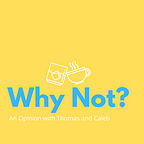The role of social media within institutionalized racism
Today is June 1st, 2020. A non-resistant George Floyd was killed by four members of the Minneapolis Police Department seven days ago. Ahmaud Arbery was on a jog when he was shot by two white men playing fake cop one hundred days ago. Eric Garner was choked by a cop until he couldn’t breath two thousand, one hundred and forty-seven days ago.
Twitter served, and continues to serve, as a conduit for disseminating the content of these three black men’s murders, and in doing so some may say has significantly raised awareness of the experience of black America, one in which you can be doing nothing wrong and still be killed. I did not learn about the death of George Floyd through Twitter — I have been avoiding the platform as a form of self-care for a few months now — but through a daily news podcast called What a Day. One of the hosts, comedian Akilah Hughes, started the episode, titled “Racism, Cont.”, in an uncharacteristic monologue reflecting upon the death of George Floyd, and reflecting upon the sharing of videos such as that of his death in a way:
“The voyeuristic nature of sharing black human beings murdered like it’s a normal thing on a Tuesday didn’t bring that guy back, it didn’t stop racism. In fact, racism didn’t end when we saw Mike Brown laying in the street, or when the Ahmad Arbury video went viral, or when Eric Garner was choked to death over a few cigarettes, or Walter Scott getting shot to death.”
The nature of sharing the deaths of black people on social media, even as an attempt to raise awareness, is something that has always served as a bit of a shock to me. Pictures and videos are shared so quickly, without much regard for what we are actually seeing. The point is to shock, and to anger into action that is desperately needed — but in some ways, sharing this media serves in feeding into the systematic racism that is baked into the structures of the different media apparatuses. Akilah Hughes again reflects on the nature of this in the episode, in saying:
“They take down videos of ISIS killing white men on Youtube. How many white men have you seen die in HD video? Can you name five? Because I bet you can’t name 10. The video footage is shorthand for our desensitization.”
We have become desensitized to the deaths of black people on social media. It has almost become a regular occurrence to see a video of a black man having his humanity stripped away from him by a police officer. And although the spreading of this has led to major activist movements such as Black Lives Matter, the effect up to this point has not been the type of large structural change that is needed in policing, or even a slight diminishing of the racism that is prevalent in our society; rather the largest effect is that now more people have seen a video or a picture of a black person dying. That is dehumanizing and feeds into the common racism in our society — we have become used to seeing black people die for unjust reasons, and although we can be angry about it, and share a post on social media, there may not be much else that people will do about it.
Obviously, this is not always the case. Over the course of the several nights, there have been protests and riots in cities across the country as a response to the death of George Floyd. Riots, ultimately, are an extremely concentrated response of emotion, in response to an oppresion which has built up and become more severe over time. It seems that the rhetoric of many “leaders” in the country, instead of looking at the riots as this sort of response, are taking them as dangers to society — as unnecessary outlashes and accumulation of damages that will ultimately hurt progress. This sort of rhetoric exists to play down the experiences of people, and to devalue the effects of these sorts of constraints that society has placed. I expect rhetoric to emerge, if it hasn’t already, that the “senseless riots are much worse, and much more damaging, than the death of one person”. To that, I would say that this isn’t one death — this is a response to the continuation of deaths of black people unjustly at the hands of the people who are supposed to be charged with protecting them. Ultimately, it is a response to something that Akilah Hughes says at the beginning of the episode, something that many believe even though they may deny it, and something that will continue to pervade the experiences of black people if there isn’t a structural change to our society itself:
“In America being black means you’re inherently a threat, and being white means you are inherently innocent”
Ultimately, every single person needs to be a part in combating this ideology. Will that happen? Undoubtedly not, as for the people who believe that there is protection in it. But there has to be a response, and a fight against it. If you are silent in times like these, where there are innocent people dying, you are on the wrong side. If you think that the riots in Minneapolis are more offensive than the excessive brutality of law enforcement on members of the black community, then you are on the wrong side. Be a part of the change that needs to happen — whether that means being an activist, or an ally, or anything that invokes the change. Don’t just share the video or the picture of a black man being dehumanized — try to understand why it has happened, and what needs to change so that this is no longer a reality in our society, and try to figure out what you can really, tangibly do.
